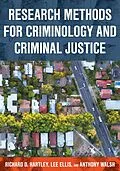The second edition of Research Methods for Criminology and Criminal Justice is a core text for criminology and criminal justice research methods courses. This text offers a general foundation of knowledge that transcends particular topics or subject areas, allowing students to apply the methods and concepts discussed to a multitude of scenarios. Within the first five chapters, students learn (a) the philosophy behind scientific research, (b) the role of theory and hypotheses in the research process, (c) ethical issues in conducting research in our field, and (d) how research reports are structured. Thereafter, each new chapter will add information and examples that help students move toward a further understanding of research design and methodology that can be applied across the social and behavioral sciences to better understand social phenomena.
Autorentext
Richard D. Hartley is professor in the Department of Criminology & Criminal Justice at University of Texas at San Antonio.
Lee Ellis is semi-retired after over thirty years as professor of sociology at Minot State University.
Anthony Walsh is professor emeritus of criminal justice at Boise State University.
The authors have varied and extensive experience with research methods in criminology and criminal justice as well as in sociology and corollary social/behavioral sciences. All authors have doctoral degrees in Criminology or Criminal Justice, and all have taught research methods courses for criminology and criminal justice as well as sociology. The authors have published in a variety of academic journals from various disciplines and all have published books in the past.
Inhalt
Chapter 1 The Scientific Method and Criminology and Criminal Justice as Social Sciences
Learning to Become a Researcher
Circumscribing Criminology and Criminal Justice
Circumscribing the Social Sciences
The Near Social Sciences
Other Disciplines that Utilize Social Science Research Methods
Two Special Disciplines Linked to Social Science
Features of the Scientific Method
The Scientific Spirit
Types of Issues Addressed by Social Scientists
Summary
Chapter 2 Formulating Scientific Questions and Locating Background Research
The Nature of Scientific Variables
Conceptual Versus Operational Definitions of Variables
Levels of Measurement
Formulating and Refining Scientific Questions
Locating Information on Topics of Interest
Distinctiveness of Scientific Communication
How Scientific Research Gets Reviewed and Sometimes Published
Summary
Chapter 3 Ethical Issues in the Social Sciences
Responsibilities to Participants of Research
Deceiving or Causing Harm to Human Participants
Obtaining Institutional Approval for Conducting Research
Responsibilities to Fellow Social and Behavioral Scientists
Ethics in Criminology and Criminal Justice Research
Responsibilities to Humanity
Summary
Chapter 4 Theories, Models, Hypotheses, and Empirical Reality
The Concept of Causation
The Nature of Scientific Theorizing
Assessing the Merit of a Theory
The Role of Theory in the Research Process
Scientific Models, Laws, and Paradigms
Hypothesis Testing and Attempts to Generalize
The Null Hypothesis and Type I and Type II Errors
Summary
Chapter 5 The Concepts of Reliability, Validity, and Precision in Measurement
Using the Concept of Correlation to Discuss Measurement Accuracy
Three Elements of Accurate Measurement
Reliability
Validity
Precision
Using Factor Analysis to Refine Measurement Accuracy
Some Closing Remarks about Reliability, Validity, and Precision
Summary
Chapter 6 Surveying and Sampling
The Nature of Scientific Surveys
Basic Terminology
Representative Versus Non-representative Samples
Probability Versus Non-Probability Sampling Methods
Sample Size
Surveying Over Time
Serving as a Respondent to a Research Questionnaires
Assessing Sample Attrition, its Extent and Causes
Computer-Assisted Interviewing
Limiting Sample Attrition
Inaccuracies in Self-Reports
Techniques for Minimizing and Detecting Dishonesty
...
